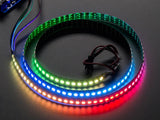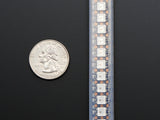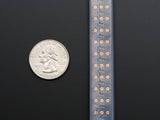We crammed ALL THE NEOPIXELS into this strip! An unbelievable 144 individually-controllable LED pixels on a flexible PCB. It's completely out of control and ready for you to blink. This strip has a black mask, and an extra heavy flex PCB.
These LED strips are even more fun and glowy. There are 144 RGB LEDs per meter, and you can control each LED individually! Yes, that's right, this is the digitally-addressable type of LED strip. You can set the color of each LED's red, green and blue component with 8-bit PWM precision (so 24-bit color per pixel). The LEDs are controlled by shift-registers that are chained up and down the strip so you can shorten or lengthen the strip. Only 1 digital out pin is required to send data. The PWM is built into each LED-chip so once you set the color you can stop talking to the strip and it will continue to PWM all the LEDs for you.
All your high-density LED dreams answered, yet there are a few things to watch for.
- First up, the ultra-high density means much higher power usage over a certain distance -35 Watts max (~7 Amps @ 5V). The max rating is assuming all the LEDs are on full white, usually the actual current for colorful design is about 1/3 to 1/2 the max current. A good power supply such as our 5V 10A supply is key!
- Second, to get high density, the controller chip is inside the LED, which is kind of cool, but also means that the chip only uses a single pin for input and a single pin for output. The protocol used is very very timing-specific and can only be controlled by microcontrollers with highly repeatable 100nS timing precision. We have example code for using with the Arduino Uno/Mega microcontroller at 8MHz and 16MHz, but it will not work with the Raspberry Pi, Basic Stamp, NETduino, any other interpreted/virtual machine microprocessor or any processor slower than 8 MHz. For those processors, check our 32 LED/meter digital LED strip which has SPI-like input/output and works well with Pi, NETduino, and other processors.
- Third, just because you have all those pixels doesn't mean you have the RAM for it - the entire strip must be buffered in memory, and we've found many Arduino UNO projects only have about 1500 bytes of RAM available after all the extras are included - enough for about 2-3 meters of the 144 LED pixels. If you want to drive multiple meters and have some other libraries included, use a Mega.
- This strip now comes with a weatherproof sheathing, you can remove it if not wanted, with a pair of scissors
The strip is made of flexible PCB material, you can cut this stuff pretty easily with wire cutters. Solder to the 0.1" copper pads at the ends and you're good to go. Of course, you can also connect strips together to make them longer, just watch how much current you need! You must use a 5V DC power supply to power these strips, do not use higher than 6V or you can destroy the entire strip.
They come in 1 meter strips with a 2 or 3-pin JST SM connector on each end and separated power/ground wires. These strips are sold by the meter! There is a join in the middle of the strip and the LEDs are not perfectly spaced at that point - it's just a tradeoff with the ability of the flex PCB maker and density.
To wire up these strips we suggest picking up a Barrel DC jack to wire in so you can connect one of our wall adapters to power it.











